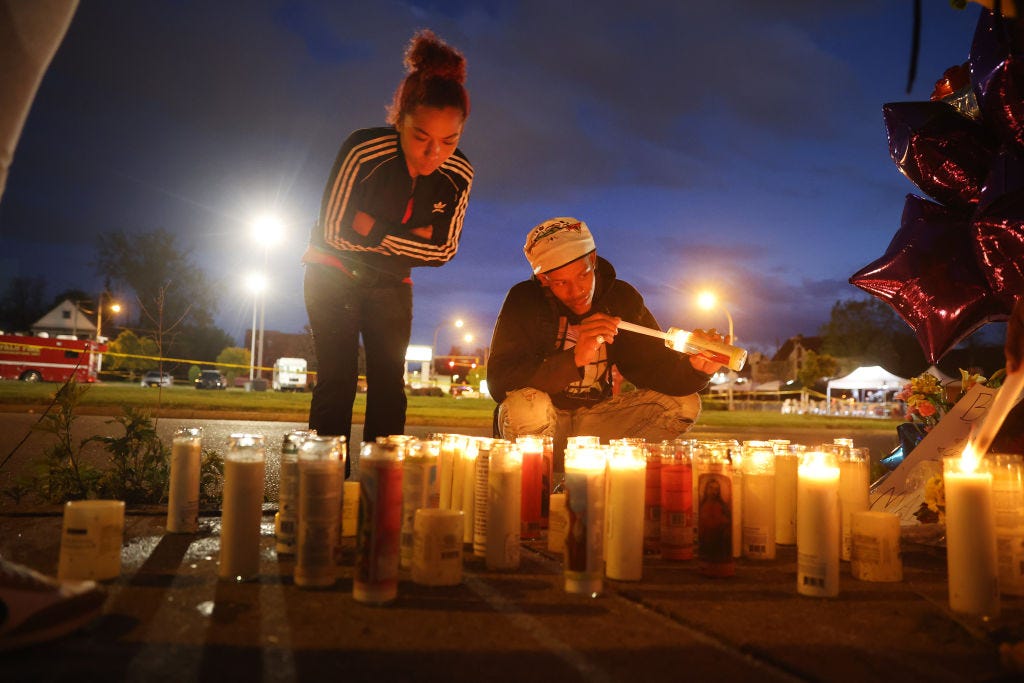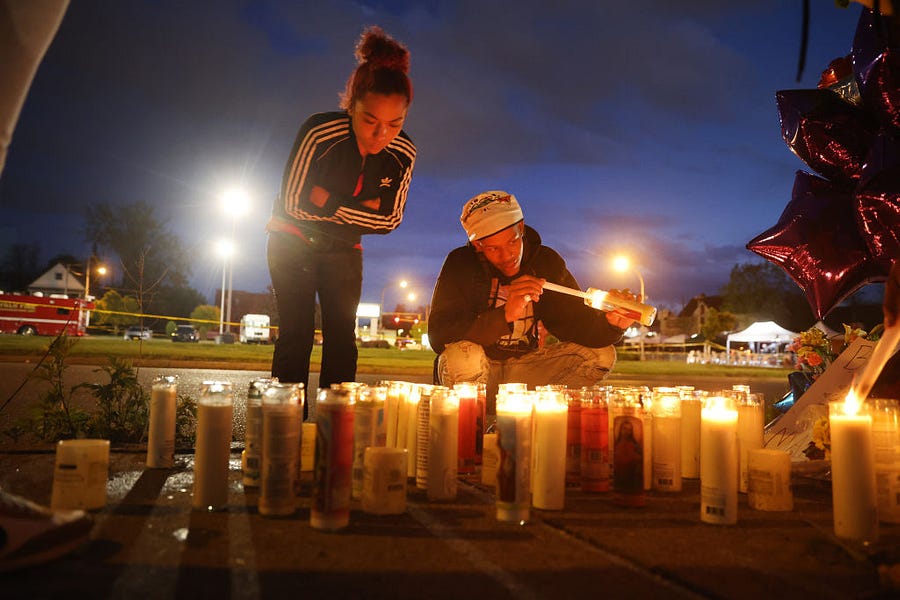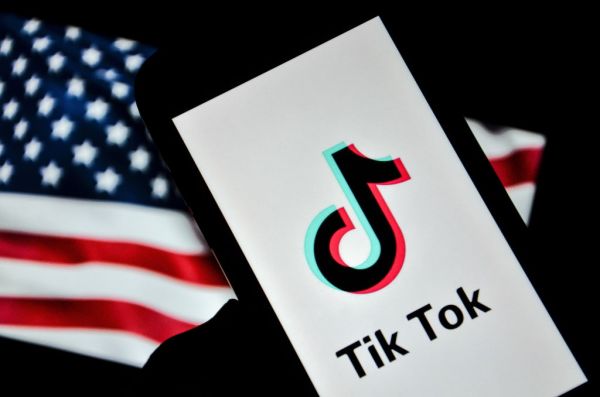Happy Tuesday! We asked you yesterday to think of a bigger geopolitical own-goal than Vladimir Putin driving Finland and Sweden into NATO’s arms with his invasion of Ukraine.
What about Vladimir Putin driving McDonald’s to permanently exit the Russian market entirely with his invasion of Ukraine?
Quick Hits: Today’s Top Stories
-
Voters head to the polls in a handful of states today: Pennsylvania, North Carolina, Kentucky, Idaho, and Oregon. Competitive GOP primaries in Pennsylvania’s gubernatorial and Senate race will test Donald Trump’s continued influence on the party and will help determine how competitive the party is next fall. In North Carolina, Trump-endorsed Rep. Ted Budd appears set to defeat former GOP Gov. Pat McCrory and former Rep. Mark Walker. Sen. Rand Paul is expected to breeze to victory in his GOP primary in Kentucky and Idaho and Oregon both feature interested gubernatorial primaries.
-
National Security Council spokeswoman Adrienne Watson confirmed yesterday that President Joe Biden signed off on a plan to redeploy up to 450 troops in Somalia in an effort to fight and contain al-Shabaab, the Islamist terrorist group. Former President Donald Trump had ordered nearly all American troops to withdraw from Somalia in the months before he left office. Hassan Sheikh Mohamud was elected president of Somalia on Sunday, returning to the post he held from 2012 to 2017.
-
The Biden administration announced Monday it will expand flights to Cuba, remove the cap on how much money people in the U.S. can send to Cuban family members, and streamline entry into the U.S. for Cubans. State Department spokesman Ned Price said the moves are intended to help Cubans “pursue a life free from Cuban government oppression and to seek greater economic opportunities.”
-
The Food and Drug Administration announced Monday it had reached an agreement with Abbott Laboratories on the safety and regulatory steps the company must take to reopen its baby formula manufacturing facility in Michigan, which has been shut down since February due to a possible contamination. Abbott said it would be able to restart its facility within two weeks of final FDA approval, and baby formula would begin hitting shelves six to eight weeks after that. The FDA also announced it would be more “flexible” on allowing foreign manufacturers to import formula, promising it will “quickly evaluate” applications from such producers.
-
Russian President Vladimir Putin on Monday appeared to signal acceptance of Finland and Sweden’s impending accession into NATO, saying Russia “has no problem” with those countries and that their decision to join the Western military alliance poses “no immediate threat.” He did note, however, that the expansion of military infrastructure in those countries would “provoke a response.”
-
The European Union told its members Friday that companies opening an account with Russian Gazprombank to pay for gas won’t be breaching sanctions, a revision to its sanction guidelines that may allow companies to pay for gas in rubles as Russia has demanded.
-
Orange County Sheriff Don Barnes said a gunman who killed one and wounded five others at a southern California Presbyterian church on Sunday was a Chinese immigrant and U.S. citizen motivated by a grievance against the Taiwanese.* The 68-year-old attacker has been charged with murder and attempted murder, and a federal hate crimes investigation is underway.
-
The Supreme Court sided with Sen. Ted Cruz’s challenge to the 2002 Bipartisan Campaign Reform Act, striking down as unconstitutional the legislation’s restrictions on a candidate’s ability to use post-election contributions to repay loans to his or her campaign. “The government has not shown that [the law] furthers a permissible anticorruption goal, rather than the impermissible objective of simply limiting the amount of money in politics,” Chief Justice John Roberts wrote for the 6-3 majority.
-
Superior Court of California Judge Maureen Duffy-Lewis on Monday struck down a 2018 California law that required companies in the state to have at least two or three women on their board of directors, holding it violated the state constitution’s equal protection clause. Another California judge struck down a similar law last month that mandated ethnic or sexual-orientation diversity on boards.
Buffalo Mourns After White Supremacist Kills 10

“We’re trying to make sense of something that is so senseless.”
That’s what Valerie Wilcox told The Buffalo News on Monday, two days after her niece—32-year-old Roberta Drury—was shot and killed by a white supremacist while shopping at the TOPS Friendly Markets on Jefferson Avenue. Drury—who moved to Buffalo from the Syracuse area to be closer to her older brother battling leukemia—was one of 13 people shot by the 18-year-old gunman, and one of 10 who died in the massacre. The others: Margus Morrison. Aaron Salter. Geraldine Talley. Celestine Chaney. Heyward Patterson. Katherine Massey. Pearl Young. Ruth Whitfield. Andre Mackniel.
The suspected shooter—who pleaded not guilty after being arraigned and charged with several counts of first-degree murder—is not from Buffalo; he allegedly drove several hours from his home in Conklin, New York. According to Buffalo Police Commissioner Joseph Gramaglia, the gunman reached the grocery store on Saturday afternoon heavily armed, wearing tactical gear and a helmet, before opening fire in the parking lot and throughout the store. Police quickly arrived on the scene, and were able to talk the teenager out of killing himself so they could arrest him.
Eleven of the 13 people shot on Saturday were black, and it quickly became clear that was by design. Within hours of the massacre, a 180-page document purportedly written by the shooter began popping up online allegedly outlining his plans and motivations. Law enforcement was still verifying its authenticity as of this weekend—and we will not be linking to it—but the words tell the bleak story of a teenager who dove headfirst into online message boards out of “extreme boredom” early in the pandemic, and emerged a young man proudly embracing the labels of racist, white supremacist, anti-Semite, fascist, and neo-Nazi. He repeatedly cited as inspirations for his act the June 2015 shooting at a black church in Charleston, South Carolina, October 2018 shooting at a synagogue in Pittsburgh, Pennsylvania, March 2019 shooting at a mosque in Christchurch, New Zealand, and August 2019 shooting at a Walmart in El Paso, Texas.
Why did he choose a grocery store in Buffalo? “[It] has the highest black population percentage and isn’t that far away,” the document reads. “Plus NY has heavy gun laws so it would ease me if I knew that any legally armed civilian was limited to 10 round magazines or cucked firearms.”
In addition to first-degree murder, federal prosecutors are investigating the shooting as a federal crime that would bring with it even harsher penalties. “From everything we know, this was a targeted attack, a hate crime, and an act of racially motivated violent extremism,” FBI Director Chris Wray said Monday. “While there remain a lot of unknowns, as there always do in an investigation at this stage, what is absolutely certain is that we at the FBI are committed to comprehensively and aggressively investigating Saturday’s attack.”
“The evidence that we have uncovered so far makes no mistake that this is an absolute racist hate crime. It will be prosecuted as a hate crime,” Gramaglia said Sunday, confirming the shooter was investigated—but dismissed—by state police last spring for telling classmates he wanted to commit a murder/suicide after graduation. “This is someone who has hate in their heart, soul, and mind.” Citing the document and other evidence, authorities added yesterday the gunman planned to commit more violence in the city had police not reached him so quickly.
Like previous shootings of its kind, Saturday’s massacre has spawned several national conversations about what might be done to prevent future such atrocities. New York Gov. Kathy Hochul has pushed for more regulation of social media platforms, telling CNN it’s “bone chilling” that individuals are not only able to both “write and subscribe to” such hateful philosophies online, but livestream their attacks. (The Buffalo shooter attempted to broadcast his rampage on Twitch; where it was seen by a handful of people; the company said it removed the video in less than two minutes, although copies later proliferated around the internet.) Buffalo Mayor Byron Brown called for “sensible gun control” on CBS, a message that will likely be echoed by President Joe Biden when he visits the site of the attack later today. (The gunman purchased his firearms legally, as state police never sought a red-flag order blocking him from doing so after his troubling comments in school.)
But in the days since the shooting, Washington’s primary focus has been on the racist theory that underpinned it. “Any act of domestic terrorism, including an act perpetrated in the name of a repugnant white nationalist ideology, is antithetical to everything we stand for in America,” Biden said over the weekend. “Hate must have no safe harbor. We must do everything in our power to end hate-fueled domestic terrorism.”
If the document investigators are treating as legitimate is indeed so, the gunman was motivated by more than hatred of black people—he believed white Americans to be the victim of an ongoing genocide. The Great Replacement Theory has existed in one form or another for decades, but it’s particularly haunting to see it filtered through the mind of a teenager whose supposed best friend is Latino.
“[I decided to] carry out the attack to show to the replacers that as long as the White man lives, our land will never be theirs and they will never be safe from us,” the alleged killer appears to have written, expressing concern about higher birthrates among non-whites. “It was to spread awareness to my fellow Whites about the real problems the West is facing, and to encourage further attacks that will eventually start the war that will save the Western world, save the White race and allow for humanity to progress into more advanced civilizations.”
In the shooter’s deranged telling, government and corporate elites—with all the expected anti-Semitic flourishes—are purposely inviting non-white immigrants to the country to “replace” white people and become a more reliable consumer and tax base.
Those sentiments are obviously abhorrent, but a slightly watered-down version of them polls shockingly well among the American public. Slightly more than 30 percent of the country—including about 50 percent of Republicans and 20 percent of Democrats—told the Associated Press they strongly or somewhat agree there are people in the United States who are trying to replace native-born Americans with immigrants who agree with their political views. More than half the Republicans surveyed in that poll reported thinking that influencing elections and changing the American way of life are major or minor factors in would-be immigrants’ decision to come to the country.
The views are in some ways a logical extension of the “demographics is destiny”-type thinking outlined nearly two decades ago in John Judis and Ruy Teixeira’s The Emerging Democratic Majority, but it’s been a small minority of Republican politicians and commentators who have pushed it in recent months.
Fox News host Tucker Carlson has been particularly brazen, repeatedly referencing versions of the theory on his show over the past year. Last September, for example, he claimed the Biden administration was trying to “change the racial mix of the country” and “reduce the political power of the people whose ancestors lived here and dramatically increase the population of Americans newly arrived from the Third World.”
“This policy is called the great replacement,” Carlson continued. “The replacement of legacy Americans with more obedient people from faraway countries.” Former Ku Klux Klan leader David Duke applauded the segment.
Carlson condemned the shooting last night as the work of a “diseased” mind, and criticized Democratic efforts to blame him—or Trump—for the shooting. The gunman listed countless inspirations for his attack over the course of his purported 180-page document, and Carlson wasn’t one of them. The shooter’s politics appear to be all over the map, as he criticized both conservatism and capitalism in addition to multiculturalism and integration. The Great Replacement theory has been around far longer than Carlson’s had his Fox show, and he never explicitly called for violence.
But when you consistently pump out provocative rhetoric to millions of people every night, you may lose control of what happens next. “The House GOP leadership has enabled white nationalism, white supremacy, and anti-semitism,” Republican Rep. Liz Cheney, a consistent critic of growing extremism tolerated by her colleagues, tweeted yesterday. “History has taught us that what begins with words ends in far worse. @GOP leaders must renounce and reject these views and those who hold them.”
“We are not just hurt. We are angry. We are mad. This shouldn’t have happened,” Garnell Whitfield—Buffalo’s former fire commissioner and the son of one of the shooter’s victims—said Monday. “We do our best to be good citizens, to be good people. We believe in God. We trust in him. We treat people with decency. And we love even our enemies.”
“[But] you expect us to keep doing this over and over again,” Whitfield continued. “Forgive and forget while the people we elect and trust in offices around the country do their best not to protect us, not to consider us equals, not to love us back. What are we supposed to do with all this anger and all this pain?”
U.S. Troops Will Return to Somalia
A few hundred U.S. troops will return to Somalia, the Department of Defense confirmed Monday—though Pentagon spokesman John Kirby declined to specify exactly how many, or what kind, or for how long. He did explain why: What we’ve been doing hasn’t been working.
In late 2020, former President Donald Trump ordered the majority of roughly 700 troops deployed to Somalia out of the country as part of his bid to finish “endless” wars. The U.S. continued its counterterrorism and training efforts by flying troops in from neighboring countries like Djibouti and Kenya, then flying them back out. But the dangerous commute slowed troops’ response times and made it more difficult to work with partners on the ground in Somalia. “It is not effective,” Africa commander Gen. Stephen Townsend told the Senate Armed Services Committee in March, noting Somalia’s political upheaval made cooperation harder. The country this weekend chose a president after a nearly two-year delay to the vote amid political violence and the outgoing president’s efforts to extend his term. “In my view, we are marching in place at best,” Townsend said in March. “We may be backsliding.”
That’s a problem because al-Shabaab—the al-Qaeda arm trying to conquer Somalia—has been growing more sophisticated in recent years, overrunning bases, capturing equipment, targeting Somali officials with suicide bombings, and even conducting a deadly attack on an American base in Kenya in January 2020. “Al-Shabaab remains al-Qaeda’s largest, wealthiest, and most deadly affiliate, responsible for the deaths of thousands of innocents, including Americans,” Townsend said during a trip to the region in February.
If all of this—a terrorist group seeking territorial control, U.S. troops taking an “advise-and-assist” role—sounds a bit familiar, you’re not crazy. Foundation for Defense of Democracies senior fellow Bill Roggio compared al-Shabaab’s training and expansion in Somalia to al-Qaeda’s operations in pre-9/11 Afghanistan. Kirby disputed the Somalia-Afghanistan comparison, noting that working remotely with in-country Somali and African Union allies is a different challenge than conducting unilateral strikes from outside Afghanistan.
Regardless, administration officials don’t want al-Shabaab to conquer Somalia and turn its attention to attacking the U.S.—federal prosecutors in 2020 charged a Kenyan man with working with al-Shabaab to plan a 9/11-style attack on the U.S. “What we’re seeing here in Somalia is an admission of the failure of Afghanistan,” Roggio argued, noting American forces’ struggles carrying out effective operations from outside Somalia demonstrate the near impossibility of remotely disrupting terrorism in Afghanistan post-withdrawal. Marine Gen. Kenneth McKenzie said in December we have “1 or 2 percent” the visibility into Afghanistan that we had pre-withdrawal. “I don’t think this administration wants to see another country fall into the al-Qaeda orbit on its watch, and it’s going to do the bare minimum to stop that from happening,” Roggio said.
So although President Joe Biden has cut down on U.S. airstrikes, the military has conducted a handful in Somalia against al-Shabaab, and Biden approved Secretary of Defense Lloyd Austin’s request to send troops back in to stay—no more than 450, unnamed officials told the New York Times. But it’s not clear how much impact they’ll have. Kirby insisted they’ll continue in a purely “advise-and-assist” role, and 450 troops would be roughly half the amount present when Trump ordered a withdrawal. “When we had 750 troops in Somalia, we were barely keeping a lid on the Shabaab problem,” Roggio said. “Now, we’re putting a smaller lid on the pot. What is it really going to do in the long run?”
Worth Your Time
-
In light of the U.S. Court of Appeals for the Fifth Circuit allowing Texas’ new social media law to (at least temporarily) go into effect, George Mason University law professor Ilya Somin reupped his July 2021 blog post highlighting problems with the legislation. “Both the right to free expression and the right to refuse a platform to speech you disapprove of are vital elements of freedom of speech,” he argued. “If Fox were forced to broadcast left-wing views they object to and the [New York] Times had to give space to right-wing ones its editors would prefer to avoid, it would be an obvious violation of their rights. Moreover, in the long run, such policies would actually reduce the quantity and quality of expression overall, as people would be less likely to establish TV stations and newspapers in the first place, if the cost of doing so was being forced to give a platform to your adversaries’ views. Thus, there should be a very strong presumption against forcing people to provide platforms for views they object to. Can proposals for common carrier regulation of social media overcome that objection? The answer should be a firm ‘no.’”
Presented Without Comment
Also Presented Without Comment
Toeing the Company Line
-
On Monday’s episode of Advisory Opinions, David and Sarah talk to Chief Judge Jeffrey Sutton of the 7th Circuit Court of Appeals. The discussion ranges far and wide but includes a focus on a subject we don’t talk enough about: state constitutional law.
-
It’s Tuesday, which means Dispatch Live is back tonight! Tune in at 8 p.m. ET/5 p.m. PT for a conversation between Jonah, Steve, Andrew, and GOP campaign strategist David Kochel about the state of the Republican Party and what to look for in primary elections around the country. If you have any questions for the gang, drop them in the comments here.
-
On the site today, Harvest and Audrey break down today’s GOP primaries in North Carolina and Pennsylvania, respectively; Andrew Fink examines why holding the Ukrainian city of Kherson has proven a headache for Russia, and Andrea Stricker writes that Iran is shockingly close to a possible surprise nuclear breakout.
Let Us Know
Are there public policy measures the government should take to curb the resurgent threat of mass shootings, or are these tragedies just the unfortunate cost of living in an increasingly angry country with a permissive gun-policy regime?
Correction, May 17, 2022: The southern California church where a gunman opened fire on Sunday was not a specifically Taiwanese church, but a Presbyterian church that hosts Taiwanese services.







Please note that we at The Dispatch hold ourselves, our work, and our commenters to a higher standard than other places on the internet. We welcome comments that foster genuine debate or discussion—including comments critical of us or our work—but responses that include ad hominem attacks on fellow Dispatch members or are intended to stoke fear and anger may be moderated.
With your membership, you only have the ability to comment on The Morning Dispatch articles. Consider upgrading to join the conversation everywhere.